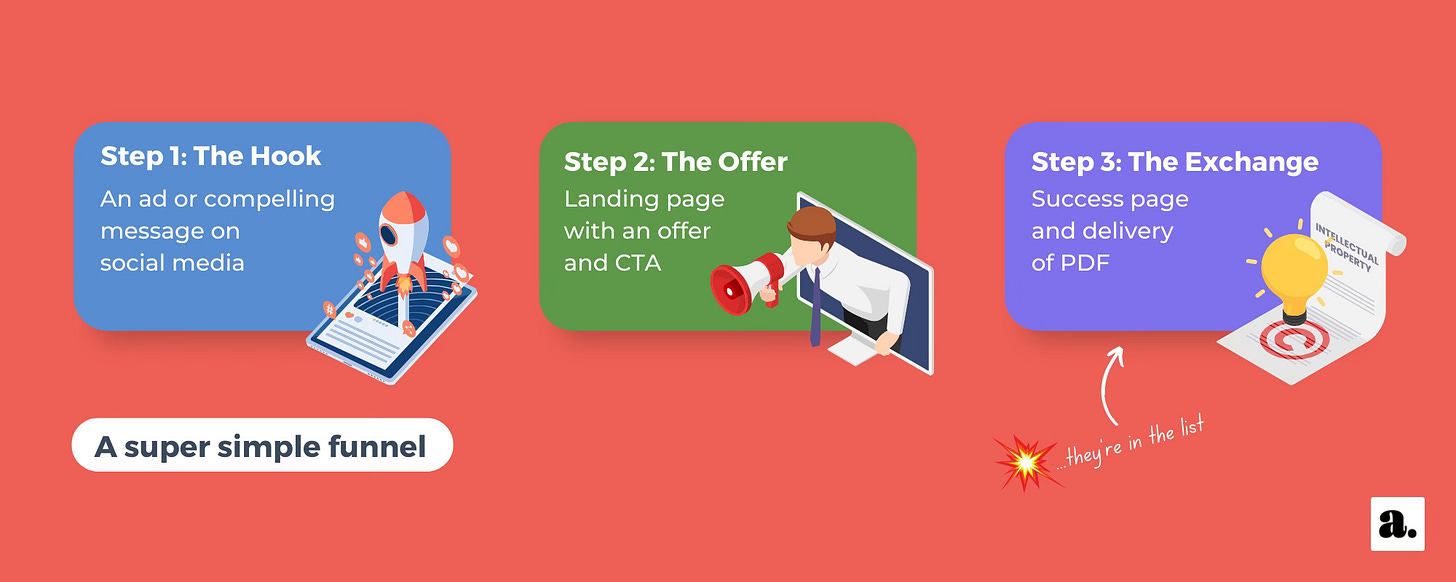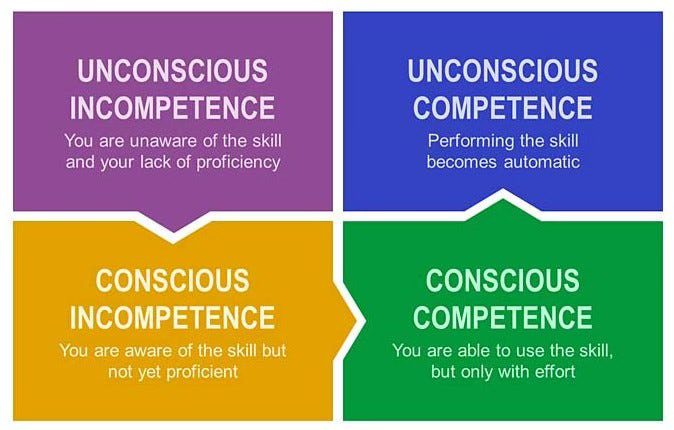The increment IS the way
Experiments, failures, and experiences; they are rocket fuel!
Sweat the small stuff.
Because, in the end, all those incremental learnings and incidental experiences are worth way more than the sum of their parts.
Experiments, failures, and experiences all become resources you can call on. They're why meetings with senior executives become easier to navigate, or why you become a better presenter over time. When you do things, you learn from them, and over time those learnings work together to unlock bigger opportunities—career jumps, personal breakthroughs, or even landing a dream client.
Sure, some people get lucky. They hit a home run off the first ball and it can feel like they’ve found the shortcut, leaving you behind. But guess what? Without the hard yards, they won’t be able to reflect on what worked or why, and on the next pitch, it’s a swing and a miss.
Look, if you stopped reading here, just remember this: The increment IS the way.
Now, if you’re anything like me, your social feeds are currently full of internet gurus offering shortcuts and hacks to “x10 your business”, unlock massive progress, or close more leads than you can possibly handle.
And let’s face it, I’ve made myself an easy target.
That’s right, I’m deep into the hot mess that is starting my own enterprise. I’m clicking through, downloading the lead magnet, and making sure that the barrier to entry for my inbox is worryingly low.
One of the key things we’re looking at today is the fact that those shortcuts, frameworks, and productivity strategies do work, but they are also illusionary because they require the right conditions and a baseline of previous experience to leverage their potential.
Real traction requires leveraging incremental learnings.
In most cases, what’s being offered is a mountain of experience that’s been distilled into a process that you can purchase and leverage. But real traction still requires you to bring the right incremental learnings to the table.
Russell Brunson, for example, is a huge advocate for funnel hacking—clicking on people’s ads to learn from the journey they’ve created for their customers. He’s even built a business empire around the idea and offers free training on how to launch your first funnel. Ultimately, the training is a sales pitch (which they are refreshingly transparent about), but there is plenty of value up front.
One of the quick wins the training will help you execute is a landing page that uses content and copy to motivate users into completing an action; buying something, booking a call, etc. Click Funnels do their best to simplify the process, but you still need to build the muscle memory that the creative side of the process requires.
The simplest funnel might look like the one below. For this example, let’s say you're just trying to build an email list and you’ve created a PDF one-pager as a lead magnet:
This is as simple as it gets, and there is A LOT going on. There’s no way around the fact that you need to be good enough at a lot of things; content, design, awareness of social best practices, hosting providers, a carefully designed PDF, an email provider, etc. The ‘hack’ can give you the format, but you’ll still need to apply time and patience to leverage results.
The structure is only part of the puzzle; the success of the execution relies on your ability to test, learn, and try again.
Brunson himself acknowledges that your first funnel will likely feel like a flop. And even though the process is simple enough at first glance, it asks you to bring plenty to the table in advance. People who can apply the process quickly and powerfully are those who can apply a myriad of incremental learnings forged from earlier experiences.
Some people get to grips with these things with sickening ease. Consider what they’ve done in the past. Have they launched an earlier business idea? Are they coming in from a marketing background? Are they practised in social media? Are they already running a personal website or blog? If yes, they are coming with a toolkit of ready-made increments that they can reapply in this new context.
Let’s zoom out for a moment and consider a macro example like the Apollo 11 moon landing. Think about Armstrong stepping off the ladder for the very first time. The world witnessed a moment of massive progress, which changed everyone’s relationship with the possible, but it was the result of decades of research and millions of incremental learnings. Indeed, today SpaceX are reimagining how these learnings can be applied in new ways, unlocking a new business model for space flight.
Zooming back in, it’s not quite as grand, but the same rules apply for any shortcut or business hack; they are solutions that have been found and forged by others who have done the hard yards. And here’s the thing: they work. But being able to execute is contingent on two factors: a) you having some skill in the background expertise those shortcuts rely on, and b) your ability to commit.
Mastery is born from increments and immersion.
The painful part is how these hacks and shortcuts can make you feel. The impact can feel diminishing because they reveal a bunch of stuff you don’t know, making you consciously incompetent. But this realisation is dramatically important because it helps you discover where to look and who to learn from. And that’s what can be great about the guru crowd because the processes they present reveal the categories and areas of skill that you need to grow in. However, the answer might not be to buy their offer immediately.
For example, I could buy Russell Brunson’s ClickFunnels 2.0 down the line, but first I’ll lean into learning areas, start experimenting, and circle back later when I feel I can maximise and understand the investment. Of course, there’s plenty of sales pressure to take the shortcut NOW, but for me at least, that would feel like going off-road before I’ve learned to drive.
You can also see how conscious incompetence is leveraged by the myriad of micro-learning apps available for smartphones. Indeed, most of their ads are designed to reveal something you don't know, or to show you a puzzle you can't solve; the frustration or desire that creates drives you into the first part of their sales process. Again, they work if you can commit, and they do a great job of responding to conscious incompetence and taking you through a journey of bite-sized chunks to conscious competence. Mastery, however, or unconscious competence, is reserved for immersion. Think about language apps: the only way to master a language is to engage in free-flowing dialogue with native speakers.
We can leverage the above framework above (The Four Stages of Competence) to triage the hacks and shortcuts coming our way and asses whether the 'hack' or framework is worth the distraction. You may find that you are consciously competent in lots of the skills the framework requires of you, in which case the decision to move ahead might be straightforward. If not, take note of what's being proposed and what feels new; isolate parts of the process that you can explore, research, and experiment with, so you can build a base level of understanding. Like the learning apps, turn the journey into bite-sized chunks.
At this stage, you may only be adding to the list of things you don't know yet, but at the very least, you're revealing what you need to know for any new shortcut to be effective. And that might be enough to allow you to move forward with confidence.
It’s important to ask whether the ‘hack’ is worth the distraction.
‘Here’s the easy way to do ‘x’’ can often leave us feeling disempowered and discouraged. Without experience, muscle memory, conscious awareness of what we don’t know, or the micro-learnings to call on, it just won’t translate into action at first. And it certainly won’t feel like a shortcut to massive progress as our wheels spin and we wrestle with what we don’t yet understand.
You don’t know what you don’t know, and you might need to spend some time forging the required experience for yourself before you can leverage a shortcut, find a foothold, and achieve some progress.
And here’s the hard truth about incremental learning: it’s often not very clear when they will align to unlock massive progress. It’s common to feel frustrated that time has been wasted on learnings, jobs, or projects that don’t immediately feel useful.
But rest assured, nothing is wasted.
Your brain is a subconscious powerhouse, able to knit your learnings and experiences together in new and surprising ways, often when you least expect it. Consider, the smell that recalls a memory, or the task you suddenly easy after you’ve taken a break. Your learnings and experience will align in new ways, and when they do, you’ll experience a rush of sudden acceleration—when something just clicks, you have the solution on a team call, or you have a killer creative idea ready to roll for the latest pitch. That breakthrough moment might feel like you’ve discovered a shortcut, but I assure you, it’s really the result of your sweat and investment over time.
Your experiences and learning will align in new and exciting ways.
Like me, you may be at a crossroads in your career. Perhaps you’re trying a few hacks that hold promise for you but you're not sure yet which ones are worth your attention, or perhaps you're starting something new and the range of tasks you've taken on feel disconnected, perhaps the forward path simply feels uncertain. If that resonates, hear me when I say that each of the experiences and incremental learnings you are currently investing time in has value and will benefit you in time.
For now, it might comfort you to remember that while you might be hungry for massive progress, you can give yourself permission to be in an incremental phase. Allow yourself to ignore some of the pitches and guru lead magnets. Firstly, you might not have the bandwidth to handle massive progress today, and you might need to build the right mental muscles first. Secondly, the path forward might not be clear yet because you're trying to skip the learning phase, which is foundational for maintaining any momentum. Clarity will come.
In reality, massive progress orbits incremental learning. You can't have the former without the latter, which brings us full circle. If you're hungry to make massive progress, remember this mantra and repeat it to yourself when frustration sets in: The increment IS the way.
And don’t just sweat the small stuff, celebrate it. After all, moon landings are made of the 1%, the marginal gain, the collective power of incremental learnings —and big things lie ahead for the patient.





